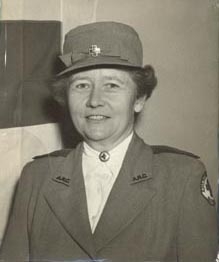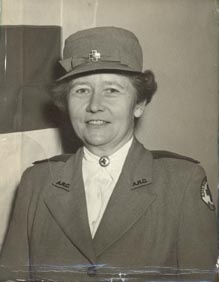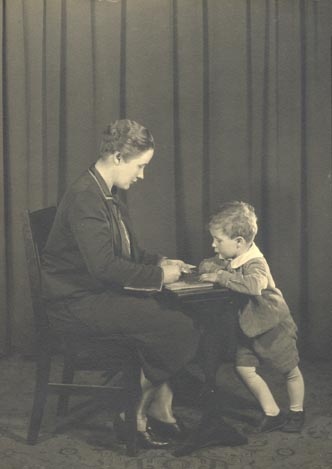Profile

Catharine Morris Cox Miles
Birth:
1890
Death:
1984
Training Location(s):
PhD, Stanford University (1925)
MA, Stanford University (1913)
BA, Stanford University (1911)
Primary Affiliation(s):
College of the Pacific (1915-1920)
Central Mental Hygiene Clinic (Cincinnati) (1925-1927)
Stanford University (1927-1932)
Yale University (1932-1953)
Other Media:
Archive
Website
Career Focus:
Genius; eminence; historiometry; gender; masculinity; femininity; personality; sexuality.
Biography
Catharine Morris Cox was born on May 20th, 1890 in San Jose, California. She attended Stanford University, majoring in German language and literature, earning her B.A. in 1911, and M.A. in 1913. After completing her M.A., she traveled to Germany, where she spent her time at the University of Jena and the University of Berlin. Upon her return to San Jose, Cox took a position at the College of the Pacific, teaching German and physical education, where she steadily rose in the ranks from instructor to full professor.
In 1920, Cox took a brief hiatus from her academic pursuits to join the American Friends Service Committee. Through her association with the Society of Friends, a Quaker organization, she heard of the opportunity to provide relief efforts in Berlin, and spent several months distributing food to those in need. Her experiences in Berlin altered her academic interests: she returned to Stanford to pursue a Ph.D. in psychology. Under the supervision of Lewis M. Terman, Cox began work on her dissertation, which was a complementary piece to Terman's Genetic Studies of Genius project. She studied the lives of 301 acclaimed geniuses, and attempted to assign IQ scores for them. She based these scores on samples of writing and work obtained for their childhood and adulthood, wherever possible. Cox received her Ph.D. in 1925, and her dissertation was subsequently published in 1926, becoming the second volume in the Genetic Studies of Genius series.
Following the completion of her studies, Cox accepted a position as chief psychologist at the Central Mental Hygiene Clinic in Cincinnati General Hospital, at the Children's Hospital, and at the Diagnostic Center of the Veteran's Bureau. However, shortly thereafter, in 1927, she accepted an offer to return to Stanford as Terman's research assistant. After her arrival at Stanford, Cox met one of Terman's colleagues, Walter R. Miles. Cox and Walter quickly struck up a relationship, and were married in September of 1927. In 1932, Walter was offered a position at Yale University's Institute of Psychology (later renamed the Institute of Human Relations). Cox Miles took up the post of clinical professor there in the Departments of Psychology and Psychiatry. Interestingly, Cox Miles was Yale's only senior clinical psychologist until after World War II.
At Yale, Cox Miles quickly finished up the work that she had begun with Terman in 1927, the result became known as the Terman-Miles Masculinity-Femininity test (originally published as the Attitude-Interest Analysis Test). The scale was fully outlined in their 1936 text, Sex and Personality. It has been suggested that Cox Miles's career at this time was a model of silent feminism, because she "examined attributes of masculinity and femininity without commitment to either the nativist or environmental explanations of gender" (Morawski & Agronick, 1991, p. 571). Even so, the scale seemed to represent a set of moral prescriptions for gendered behavior and mental health, rather than a neutral measurement tool. The underlying message was that to achieve good mental health, one's sex must dictate one's gender in both thought and behavior. In this way, Terman's negative views on homosexuality also pervaded the test. However, it is unclear whether or not (or to what degree) Cox Miles shared these views. Despite these drawbacks, the Terman-Miles M-F test set the bar for masculinity-femininity scale construction for the next several decades.
Cox Miles and her husband retired from Yale in 1953, and moved to Turkey a year later. For the next three years Walter taught at the University of Istanbul. In 1957, the couple moved back to Connecticut, where they remained for the next ten years. Cox Miles passed away on October 11, 1984.
Catharine Cox Miles remains known for her work on eminence and the assessment of masculinity-femininity. In 1967, the American Psychological Association honored her for her lifetime contributions to psychology. Robert R. Sears said of her: "Dr. Catharine Cox Miles was one of that sturdy band of post-World War I women psychologists... who were the models for many of today's professional women psychologists" (Sears, 1986, p. 432).
by Laura Ball (2010)
To cite this article, see Credits
Selected Works
By Catharine Cox Miles
Cox, C. M. (1926). Genetic studies of genius: The early mental traits of three hundred geniuses (Vol. 2, L. M. Terman, Ed.). Stanford, CA: Stanford University Press.
Miles, C. C. (1931). The Otis S-A as a fifteen minute intelligence test. Personnel Journal, 10, 246-249.
Miles, C. C. (1935). Sex in social psychology. In C. Murchison (Ed.), A Handbook of Social Psychology (pp. 683-797). Worcester, MA: Clark University Press.
Miles, C. C., & Miles, W. R. (1932). The correlation of intelligence scores and chronological age from early to late maturity. American Journal of Psychology, 44, 44-78.
Miles, C. C., & Terman, L. M. (1929). Sex difference in the association of ideas. American Journal of Psychology, 41, 165-206.
Miles, C. C., & Wolfe, L. S. (1936). Childhood physical and mental health records of historical geniuses. Psychological Monographs, 47, 390-400.
Terman, L. M., & Miles, C. C. (1936). Sex and personality. New Haven, CT: Yale University Press.
About Catharine Cox Miles
Hegarty, P. (2007). From genius introverts to gendered intelligence: Lewis Terman and the power of the norm. History of Psychology, 10, 132-155.
Hegarty, P. (2012). Getting Miles away from Terman: Did the CRPS fund Catharine Cox Miles's unsilenced psychology of sex?. History of Psychology, 15, 201-208.
Miles, W. R. (1967). Walter R. Miles. In E. G. Boring & G. Lindzey (Eds.), A history of psychology in autobiography (Vol. 5) (pp. 221-252). East Norwalk, CT: Appleton-Century-Crofts.
Minton, H. L. (1988). Lewis M. Terman: Pioneer in psychological testing. New York: New York University Press.
Minton, H. L. (2002). Departing from deviance: A history of homosexual rights and emancipatory science in America. Chicago, IL: University of Chicago Press.
Morawski, J. G. (1985). The measurement of masculinity and femininity: Engendering categorical realities. Journal of Personality, 53, 196-223.
Robinson, A., & Simonton, D. K. (2014). Catharine Morris Cox Miles and the lives of others (1890-1984). In A. Robinson & J. Jolly (Eds.), A century of contributions to gifted education: Illuminating lives (pp. 101-114). London: Routledge.
Sears, R. R. (1986). Catharine Cox Miles: 1890-1984. American Journal of Psychology, 99, 431-433.
Simonton, D. K. (2020). Galton, Terman, Cox: The distinctive Volume II in Genetic Studies of Genius. Gifted Child Quarterly, 64, 275-284.
Photo Gallery




Catharine Morris Cox Miles
Birth:
1890
Death:
1984
Training Location(s):
PhD, Stanford University (1925)
MA, Stanford University (1913)
BA, Stanford University (1911)
Primary Affiliation(s):
College of the Pacific (1915-1920)
Central Mental Hygiene Clinic (Cincinnati) (1925-1927)
Stanford University (1927-1932)
Yale University (1932-1953)
Other Media:
Archive
Website
Career Focus:
Genius; eminence; historiometry; gender; masculinity; femininity; personality; sexuality.
Biography
Catharine Morris Cox was born on May 20th, 1890 in San Jose, California. She attended Stanford University, majoring in German language and literature, earning her B.A. in 1911, and M.A. in 1913. After completing her M.A., she traveled to Germany, where she spent her time at the University of Jena and the University of Berlin. Upon her return to San Jose, Cox took a position at the College of the Pacific, teaching German and physical education, where she steadily rose in the ranks from instructor to full professor.
In 1920, Cox took a brief hiatus from her academic pursuits to join the American Friends Service Committee. Through her association with the Society of Friends, a Quaker organization, she heard of the opportunity to provide relief efforts in Berlin, and spent several months distributing food to those in need. Her experiences in Berlin altered her academic interests: she returned to Stanford to pursue a Ph.D. in psychology. Under the supervision of Lewis M. Terman, Cox began work on her dissertation, which was a complementary piece to Terman's Genetic Studies of Genius project. She studied the lives of 301 acclaimed geniuses, and attempted to assign IQ scores for them. She based these scores on samples of writing and work obtained for their childhood and adulthood, wherever possible. Cox received her Ph.D. in 1925, and her dissertation was subsequently published in 1926, becoming the second volume in the Genetic Studies of Genius series.
Following the completion of her studies, Cox accepted a position as chief psychologist at the Central Mental Hygiene Clinic in Cincinnati General Hospital, at the Children's Hospital, and at the Diagnostic Center of the Veteran's Bureau. However, shortly thereafter, in 1927, she accepted an offer to return to Stanford as Terman's research assistant. After her arrival at Stanford, Cox met one of Terman's colleagues, Walter R. Miles. Cox and Walter quickly struck up a relationship, and were married in September of 1927. In 1932, Walter was offered a position at Yale University's Institute of Psychology (later renamed the Institute of Human Relations). Cox Miles took up the post of clinical professor there in the Departments of Psychology and Psychiatry. Interestingly, Cox Miles was Yale's only senior clinical psychologist until after World War II.
At Yale, Cox Miles quickly finished up the work that she had begun with Terman in 1927, the result became known as the Terman-Miles Masculinity-Femininity test (originally published as the Attitude-Interest Analysis Test). The scale was fully outlined in their 1936 text, Sex and Personality. It has been suggested that Cox Miles's career at this time was a model of silent feminism, because she "examined attributes of masculinity and femininity without commitment to either the nativist or environmental explanations of gender" (Morawski & Agronick, 1991, p. 571). Even so, the scale seemed to represent a set of moral prescriptions for gendered behavior and mental health, rather than a neutral measurement tool. The underlying message was that to achieve good mental health, one's sex must dictate one's gender in both thought and behavior. In this way, Terman's negative views on homosexuality also pervaded the test. However, it is unclear whether or not (or to what degree) Cox Miles shared these views. Despite these drawbacks, the Terman-Miles M-F test set the bar for masculinity-femininity scale construction for the next several decades.
Cox Miles and her husband retired from Yale in 1953, and moved to Turkey a year later. For the next three years Walter taught at the University of Istanbul. In 1957, the couple moved back to Connecticut, where they remained for the next ten years. Cox Miles passed away on October 11, 1984.
Catharine Cox Miles remains known for her work on eminence and the assessment of masculinity-femininity. In 1967, the American Psychological Association honored her for her lifetime contributions to psychology. Robert R. Sears said of her: "Dr. Catharine Cox Miles was one of that sturdy band of post-World War I women psychologists... who were the models for many of today's professional women psychologists" (Sears, 1986, p. 432).
by Laura Ball (2010)
To cite this article, see Credits
Selected Works
By Catharine Cox Miles
Cox, C. M. (1926). Genetic studies of genius: The early mental traits of three hundred geniuses (Vol. 2, L. M. Terman, Ed.). Stanford, CA: Stanford University Press.
Miles, C. C. (1931). The Otis S-A as a fifteen minute intelligence test. Personnel Journal, 10, 246-249.
Miles, C. C. (1935). Sex in social psychology. In C. Murchison (Ed.), A Handbook of Social Psychology (pp. 683-797). Worcester, MA: Clark University Press.
Miles, C. C., & Miles, W. R. (1932). The correlation of intelligence scores and chronological age from early to late maturity. American Journal of Psychology, 44, 44-78.
Miles, C. C., & Terman, L. M. (1929). Sex difference in the association of ideas. American Journal of Psychology, 41, 165-206.
Miles, C. C., & Wolfe, L. S. (1936). Childhood physical and mental health records of historical geniuses. Psychological Monographs, 47, 390-400.
Terman, L. M., & Miles, C. C. (1936). Sex and personality. New Haven, CT: Yale University Press.
About Catharine Cox Miles
Hegarty, P. (2007). From genius introverts to gendered intelligence: Lewis Terman and the power of the norm. History of Psychology, 10, 132-155.
Hegarty, P. (2012). Getting Miles away from Terman: Did the CRPS fund Catharine Cox Miles's unsilenced psychology of sex?. History of Psychology, 15, 201-208.
Miles, W. R. (1967). Walter R. Miles. In E. G. Boring & G. Lindzey (Eds.), A history of psychology in autobiography (Vol. 5) (pp. 221-252). East Norwalk, CT: Appleton-Century-Crofts.
Minton, H. L. (1988). Lewis M. Terman: Pioneer in psychological testing. New York: New York University Press.
Minton, H. L. (2002). Departing from deviance: A history of homosexual rights and emancipatory science in America. Chicago, IL: University of Chicago Press.
Morawski, J. G. (1985). The measurement of masculinity and femininity: Engendering categorical realities. Journal of Personality, 53, 196-223.
Robinson, A., & Simonton, D. K. (2014). Catharine Morris Cox Miles and the lives of others (1890-1984). In A. Robinson & J. Jolly (Eds.), A century of contributions to gifted education: Illuminating lives (pp. 101-114). London: Routledge.
Sears, R. R. (1986). Catharine Cox Miles: 1890-1984. American Journal of Psychology, 99, 431-433.
Simonton, D. K. (2020). Galton, Terman, Cox: The distinctive Volume II in Genetic Studies of Genius. Gifted Child Quarterly, 64, 275-284.



